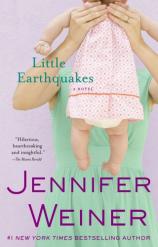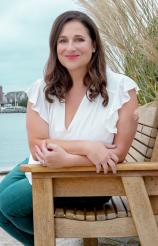Reading Group Guide
Discussion Questions
Little Earthquakes: A Novel

1. All four of the women who star in Little Earthquakes have complicated relationships with their mothers or mothers-in law. Think about how these relationships affect them and the bonds they develop with their babies. For instance, how do Ayinde's childhood memories and the current dynamics between her and her mother affect the relationship she develops with Julian? Ayinde clearly wants to raise her child differently than her parents raised her, but she also shows she wants to live up to her mother's expectations by taking Baby Success! seriously. How do you think this blend of motivations will affect Julian?
2. In Little Earthquakes, Ayinde, Kelly, and Becky each take a different approach to raising their baby. Ayinde tries Baby Success!; Kelly starts with a type A approach, keeping track of every little detail on spreadsheets and making sure Oliver has the perfect clothes and toys; and Becky goes for a more laid back, all-natural strategy. How do their approaches work out for them? Does any one approach seem to work out better than the others?
3. In the midst of their personal troubles, Becky's friends sometimes have a hard time remembering the ways in which they are fortunate. Kelly, in particular, tends to be scornful when people call her "lucky." But towards the end of the novel, Becky says, "If there was one lesson she'd learned from new motherhood, and from her friends, it was that any bit of good fortune had to be counted as lucky - and that there was always, always someone worse off than you" (398). How does motherhood help put things in perspective for Becky? What does she learn from her friends, and what can we learn by comparing the experiences of each of the four women?
4. Kelly puts a lot of pressure on herself and on Steven to maintain the kind of life she couldn't have growing up. The schedule she tries to maintain is difficult, but it's not that different from the "double shift" of work and chores that many women take on when they have kids. Still, as the article in Power magazine read, "if Kelly O'Hara Day, with her smarts and her savvy and her Ivy League degree, can't successfully integrate a career and a family, it doesn't suggest that things for other working mothers are much different -- or that thirty some years after the feminists waged a so-called revolution, the workplace is likely to become a kinder, gentler place for the women who will follow in her footsteps" (441). Do you think Kelly mismanaged her life, or do you think the choices available to working women, are, as the reporter wrote, likely to put any woman in a tough spot? Can women today really have it all, or do they need to choose between having a family and having a career?
5. Both Ayinde and Kelly consider divorce at some point. When Ayinde considers leaving Richard, she thinks of the chapter on divorce in Baby Success!: "Marriage on the rocks? Keep your eyes on the prize. Remember what really matters. Remember who comes first. Babies do better with mommy and daddy both under the same roof" (298-9). Is this good advice? Were you surprised that Ayinde patched things up with Richard? Do you think either Ayinde or Kelly should have followed through with a divorce?
6. When Lia flees to Philadelphia, she leaves her husband behind, even though they love each other very much. She says, "Every time he looked at me, he'd see what we had lost; every time I looked at him, I'd see the same thing. I couldn't stay. I couldn't stay and hurt him anymore" (5). Why does Lia assume that her presence is hurting her husband? Where does her sense of culpability and guilt come from, and how do they complicate her grief? Why does she finally reach out to Sam?
7. After Ayinde learns what's causing Julian's heart murmur, she thinks, "A hole in his heart. It was almost poetic. She'd been walking around for weeks feeling like someone had torn a hole in her own" (354). How does Julian's malady reflect the injury that Ayinde has sustained on an emotional level, and what do his prospects for health and well-being imply about hers and the well-being of her friends, who have each had their own struggles?
8. Kelly's mother, Paula, tries to convince her daughter that covetousness is a sin. She says, "You should be concerned with the state of your soul, not the state of your bank account" (48). Considering the kind of life Kelly had at home, it's not surprising that she doesn't take her mother's advice to heart. Should she have taken her more seriously? Why does Kelly strive so hard to find the perfect accessories? Is she truly covetous? Is she looking for security? Does she wish to appear affluent? Does she appreciate nice things aesthetically? Whatever her motivation is, do you think she will ever be satisfied by the acquisition of objects?
9. Like all of the other characters, Ayinde's life changes dramatically when she has Julian. However, unlike Becky and Kelly, she also finds that she can no longer continue her career, due to her new husband's celebrity. How does Ayinde's sense of self change after she marries and has her baby? Do you think she makes choices for Julian and for herself that she would not have made if she could work? How is her relationship with her husband and baby affected by her decision not to pursue her career?
10. Becky has struggled with body image throughout her life, but her pregnancy seems to draw her attention to her weight more than usual. She had hoped that pregnancy would allow her to relax a little, but instead she finds herself playing "pregnant or just fat?" How does this disappointment and Becky's struggle with body image affect her experience with pregnancy?
11. Similarly, the characters experience numerous aspects of pregnancy and childbirth that they didn't really expect, or with which they were disappointed. Together, they discuss things that surprised them like the unpleasant physical side affects of pregnancy and baby farts, and more serious unexpected problems like Lia's trouble getting Caleb to sleep. Why do you think the characters, many of whom read books like What to Expect When You're Expecting or took classes in childbirth and baby care, found themselves confused and surprised so often? How did their expectations of motherhood conflict with reality? Where do you think their expectations came from?
Little Earthquakes: A Novel
- Publication Date: June 28, 2005
- Paperback: 448 pages
- Publisher: Washington Square Press
- ISBN-10: 0743470109
- ISBN-13: 9780743470100








